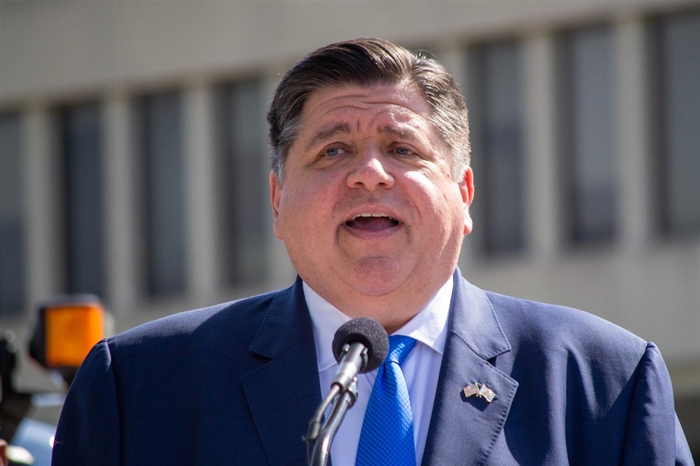Illinois ends fiscal year with record $50.7 billion in base revenue, sparking small surplus

State revenues once again reached a record high in the fiscal year that ended June 30, creating what Gov. JB Pritzker called a “one-time” budget surplus of over $700 million.
The $50.7 billion in base general revenues that the state collected in fiscal year 2023 – which exclude one-time pandemic-related federal funds – topped last year’s previous record by $373 million.
That’s $726 million beyond what was projected by the Governor’s Office of Management and Budget in its most recent estimate adopted in May during negotiations for the fiscal year 2024 budget.
“It’s always good to have a surplus, and that’s something that we’ve done consistently now for four years,” Pritzker said at an unrelated Friday news conference. “I would add that much of the surplus that we saw that came in at the end of the year is one-time dollars.”
In recent years, the state has dedicated surpluses to paying down long- and short-term debt, making pension payments beyond the amounts required in law and providing one-time temporary tax relief.
Pritzker indicated he’d continue to be cautious when considering spending priorities for one-time revenues, echoing his budget office, which noted that revenues have fluctuated wildly from month to month in recent years.
“This is a kind of an unexpected additional amount of money,” Pritzker said. “We’re going to try to apply it to things like paying down debt, the things that we’ve been doing.”
A cushion for 2024
The surplus creates some breathing room one week into a $50.4 billion state spending plan for fiscal year 2024 that anticipates a slimmer surplus of $183 million.
“The overperformance in FY 2023 revenues essentially translated into a lower than projected June 30 bills on hold at the (comptroller’s office) and higher than expected cash balances going into the new fiscal year,” Carol Knowles, a spokesperson for GOMB, said in a statement prior to the governor’s comments. “We will continue to monitor the revenue performance in FY 2024 as the national economy continues to have mixed economic projections.”
Comptroller Susana Mendoza’s office noted the state entered the year with over $1 billion in its general revenue fund and an accounts payable balance of just over $500 million, meaning bills are paid within a week of being sent to Mendoza’s office. The balance of the state’s “rainy day” fund sits at nearly $2 billion.
It’s a drastic departure from 2017, when a state budget impasse between Republican Gov. Bruce Rauner and Democrats in the General Assembly drove the state’s backlog of unpaid bills to nearly $17 billion and depleted the rainy day fund to less than $60,000.
“All this good fiscal news did not happen by accident,” Mendoza said in a statement. “This takes strong strategic planning throughout the year and daily attention to cash management; knowing which bills to pay first to maximize federal matching funds so we can end the fiscal year on such a high note.”
Pritzker said Friday that getting bills out the door within three to five days might be “too fast” a turnaround, since they are being paid days to weeks before late-payment interest begins accruing.
“We could be earning interest on the money and wouldn’t be paying interest on that if you just extended it for a few more days,” he said. “But meanwhile, I think we should all celebrate the fact that Illinois is in such good fiscal shape.”
The General Assembly’s Commission on Government Forecasting and Accountability – a bipartisan body staffed by nonpartisan economic analysts – noted in its June report that state coffers accumulated $407 million in interest in FY 2023. That’s up from just $30 million in interest in FY 2022, a result of several interest rate hikes by the Federal Reserve.
FY 2023’s revenues were also bolstered by a $1.2 billion transfer into the general revenue fund from the state’s income tax refund fund. The amount of that annual statutory transfer was driven upward by strong income tax receipts from the prior fiscal year and is unlikely to be replicated in FY 2024.
Despite setting a new base revenue record, FY 2023 saw a $1.3 billion drop-off in personal income tax receipts compared to the previous fiscal year. Corporate income tax and sales tax revenues, however, spiked by a combined $1.1 billion.
The COGFA report noted that the personal income tax decline “is believed to be more reflective of exceptional tax performance in FY 2022… rather than a weakening of Illinois’ tax base.”
Conservative estimates exceeded
FY 2023 marked the second consecutive year in which state revenues exceeded initial estimates by billions of dollars. FY 2022’s base revenues of $50.3 billion – again, a number that excludes federal pandemic aid – topped that year’s initial estimate by nearly $8 billion.
Despite the record revenue performance of FY 2022, lawmakers ultimately approved a $46.4 billion budget plan that anticipated an 8 percent decline in base revenues in FY 2023.
That was, in part, a response to ongoing concerns of a recession, which COGFA noted lingered throughout FY 2023 but did not materialize.
Instead, revenues grew by a little less than 1 percent, driven by a continued strong performance in the first eight months of the fiscal year. Through February, each month of FY 2023 exceeded revenues of the prior year.
That led lawmakers to pass multiple supplemental spending plans throughout the fiscal year, dedicating about $2.7 billion to retiring long-term debt while supplementing the state’s Medicaid program, bolstering pension payments and creating a “closing fund” to lure businesses to the state among other measures.
The fiscal picture got murkier in April, however, as revenues plummeted by $1.8 billion from the year prior, leading GOMB to estimate just less than $50 billion in end-of-year revenues as lawmakers finalized a budget plan.
May revenues rebounded, however, in part because the month had an extra weekday to process tax payments compared to the year prior, while April had one fewer.
June came in slightly behind the same month in FY 2022, but COGFA noted that, too, was “mainly the result of the timing of receipts…rather than a declining trend in taxable income.”
Employment and wage levels in June, the report added, “continue to show year-over-year improvement.”
Still, COGFA’s report noted that “many economic forecasters still have a recession in the short-term as a distinct possibility.” It also noted the investment bank Goldman Sachs reduced its projected odds of the U.S. economy entering a recession in the next 12 months to 25 percent from 35 percent.
The governor’s office has noted its FY 2024 budget, which plans for $50.6 billion in revenue, anticipates a “mild recession.”
Federal stimulus
The FY 2023 revenue figures jump to $53.1 billion when including federal dollars.
That’s due in part to an accounting measure that switched the funding source of about $1.7 billion in one-time pandemic-driven programs – such as infrastructure and grant programs – from federal stimulus funds to general revenue funds. Federal stimulus funds that had been earmarked for those projects will instead be redirected to other qualifying state expenditures, freeing up the general funds.
The move – which has no net effect on available state finances – was proposed by the governor and approved by lawmakers to ensure the state “fully expends” its COVID-19 recovery funds “within the allowed timeframe set by the federal government,” according to GOMB.
The governor’s office said the move ensures all commitments of pandemic stimulus funds are honored while providing a cleaner reporting process to the federal government, particularly for projects that have multi-year timelines for completion.
Miss Clipping Out Stories to Save for Later?
Click the Purchase Story button below to order a print of this story. We will print it for you on matte photo paper to keep forever.

